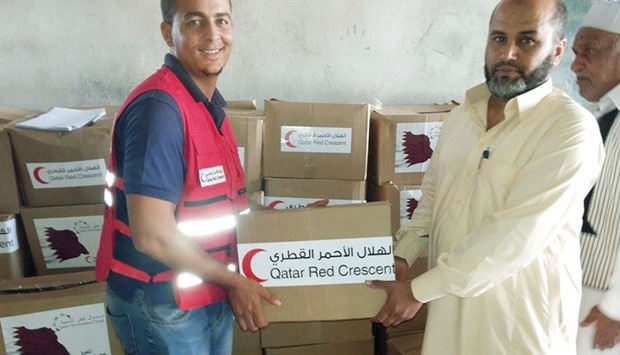Qatar Red Crescent Society (QRCS) has been conducting a large-scale relief intervention to help the displaced families affected by the armed conflict in Libya.
The operation has received QR36.37mn as grant from Qatar Development Fund (QDF).
Amid deteriorating economic conditions across Libya, the number of internally displaced people (IDPs) has been rising. Lack of food security now threatens 1.4mn lives, QRCS said in a statement.
The society has launched a $2mn scheme to distribute food aid to 19,500 most affected families (117,000 people) in several parts of the country over six months.
“This intervention will help meet the food needs of those families, reduce malnutrition among children, alleviate the psychological impact on vulnerable people like children and women, and lighten the economic burden on the Libyan families.”
In co-operation with local partners, the first two phases have distributed 8,000 food packages (one per family) to 48,000 people in cities and districts, such as Misurata, Zawiya, Jufra, Bani Walid, Sabratha, and Wadi Al-Shatii.
Another scheme was initiated this month to support the failing health sector at a cost of $3.5mn. Many hospitals and health centres in the country lack adequate staffing, medications, and other supplies, and so are unable to receive the increasing numbers of patients. Some 1.9mn people have no access to primary healthcare.
To bridge this gap, QRCS is working to secure medications, medical consumables, and ambulances to improve primary healthcare services, raise health and personal hygiene awareness to reduce communicable diseases, and build capacity of local medical workers through technical training.
A first batch of six medical supply containers have already reached the Port of Tripoli and will be distributed soon to the undersupplied hospitals, helping them serve as many as 20,000 families (120,000 people) in Ubari, Sabha, Murzuk, Jufra, Misurata, Tripoli, Zawiya, Sabratha, Zuwarah, Yafran, and Al-Makhzan.
Throughout 2016, QRCS will continue to provide food and medical aid where it is badly needed, as well as supporting Libyan families in other aspects like shelter, clean drinking water, health education, and personal hygiene.

A man receives a food carton from a QRCS volunteer.
